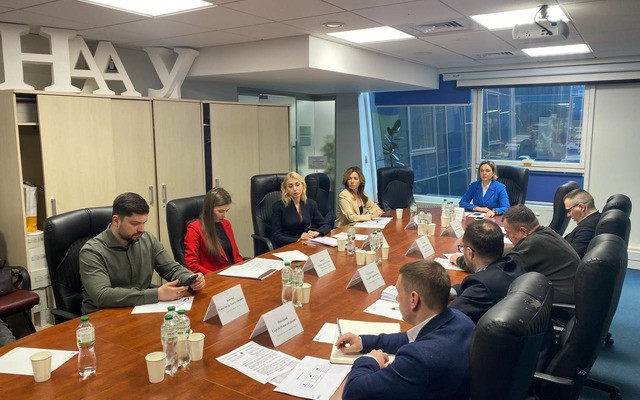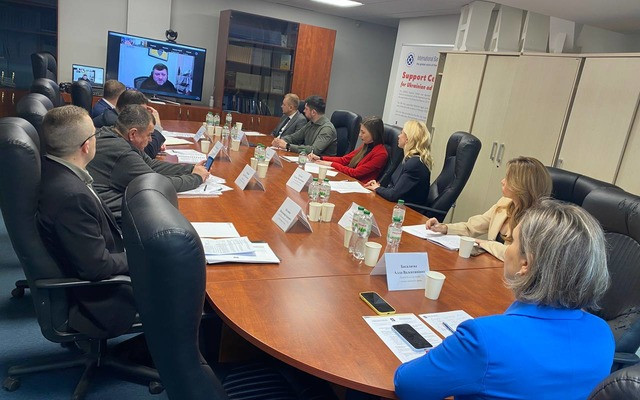
What changes to election legislation are needed were discussed at the round table


Under martial law, Ukrainian legislation prohibits the holding of presidential and parliamentary elections. However, public perception and trust in the electoral process will have to be ensured after the war.
Participants of the roundtable discussion «Post-War Elections in Ukraine: Problems, Challenges, and Solutions» organized by the Ukrainian National Bar Association's Committee on Electoral Law discussed the changes that the Ukrainian electoral law needs. The event was attended by politicians, judges, representatives of the Central Election Commission of Ukraine and academics.
Oleksandr Kornienko, First Deputy Chairman of the Verkhovna Rada of Ukraine, outlined the current situation in the context of parliamentary legislative initiatives on post-war elections and outlined the obstacles that need to be removed before the election process can be launched. He drew attention to the fact that working groups responsible for post-war elections are working within the framework of relevant legislative issues. The MP noted the supporting role of the Council of Europe's expert institutions on constitutional and legal issues of the electoral process in the post-war period, taking into account the activities of the European Commission for Democracy through Law (Venice Commission).
Mykhailo Smokovych, Chairman of the Administrative Court of Cassation within the Supreme Court, emphasized the importance of ensuring judicial protection of electoral rights in the context of active and passive suffrage, as well as the role of administrative courts in the electoral process. He also emphasized the importance of cooperation in joint educational activities on constitutional and legal issues of the functioning of public authorities in Ukraine.
Serhiy Ionushas, Chairman of the Verkhovna Rada Committee on Law Enforcement, is convinced that the conditions for holding democratic elections and preparations for them are very important in terms of the perception of Ukraine by the European Union and the world. He also expressed his readiness to cooperate at the level of the Verkhovna Rada of Ukraine and the Ukrainian National Bar Association.
Oleksandr Kachura, Deputy Chairman of the Verkhovna Rada Committee on the Organization of State Power, Local Self-Government, Regional Development and Urban Planning, emphasized the importance of the security factor in the post-war elections. He believes that the legislative condition for holding post-war elections is to regulate this issue in a legislative act that will have a temporary special character.
Serhiy Postivyi, member of the Central Election Commission of Ukraine, spoke about the relevance of preparing electoral legislation in advance for the post-war elections, as there are many urgent problems that need to be addressed. As the head of the CEC's working group on developing proposals for organizing voting by voters residing or staying in a foreign country on the day of the election, the speaker outlined a number of urgent issues to ensure effective voting abroad.
Serhiy Dubovyk, a member of the Central Election Commission of Ukraine, highlighted the technical issues that are the subject of the CEC's jurisdiction and that will take place in the next post-war elections in Ukraine. The speaker analyzed the relevant indicators in digital terms that should be taken into account by parliamentarians and executive authorities in preparation for the next post-war elections.
Andriy Yevstigneev, a member of the Central Election Commission of Ukraine and member of the Board of the UNBA Committee on Election Law outlined the issues of optimizing voting, in particular, in terms of improving the form of the ballot and simplifying the voting process in the context of the simplified format of this document, which will facilitate the exercise of voting rights.
Olha Lotiuk, Chairman of the Department of Constitutional Law at Taras Shevchenko National University of Kyiv, drew attention to the constitutional and legal characteristics of the post-war elections. She noted that in the context of the exercise of electoral rights, in particular passive suffrage, they are not absolute but relative.
Volodymyr Kistianyk, Deputy Chairman of the UNBA Committee on Electoral Law, presented ways to improve the electoral system in Ukraine during the post-war elections. He analyzed the implementation of electoral procedures in the context of the post-war period of elections in Croatia and the possibility of borrowing the best practices of this experience for Ukraine.
Liubov Krygan, a member of the Council of the UNBA Committee on Election Law, outlined the current problems of voting by voters residing or staying in foreign countries. The speaker highlighted statistical data that will affect the issue of holding elections abroad and possible ways to solve the problems that arise. Thus, there are currently 4.3 million Ukrainian voters in the EU countries who have temporary protection status, but the number of people with this status is decreasing.
According to Eurostat, the main EU countries that have received the largest number of Ukrainians are:
- Germany - 1,270,150 people (29.5% of the total number in the EU);
- Poland - 951,560 people (22.1%);
- Czech Republic - 381,190 people (8.9%).
Tetyana Saviak, a member of the Council of the UNBA Committee on Electoral Law, made a presentation on the risks of holding elections in the post-war period. She paid special attention to the issue of the criteria for the impossibility of holding elections in the temporarily occupied territories, and also emphasized the problems of exercising active and passive suffrage in the de-occupied territories.
Mykola Torbeyev, a member of the UNBA Election Law Committee, supported the thesis that a special law on post-war elections is appropriate and emphasized the expediency of balancing the legal issues of the existing electoral system and resolving controversial issues of its functioning.
Alla Basalaeva, Chairman of the UNBA Committee on Electoral Law, summarized the positions of the participants and expressed the readiness of the legal community to actively cooperate with the legislative, executive and judicial branches of power to resolve the problematic issues of post-war elections in Ukraine.
© 2025 Unba.org.ua Всі права захищені
"Національна Асоціація Адвокатів України". Передрук та інше використання матеріалів, що розміщені на даному веб-сайті дозволяється за умови посилання на джерело. Інтернет-видання та засоби масової інформації можуть використовувати матеріали сайту, розміщувати відео з офіційного веб-сайту Національної Асоціації Адвокатів України на власних веб-сторінках, за умови гіперпосилання на офіційний веб-сайт Національної Асоціації Адвокатів України. Заборонено передрук та використання матеріалів, у яких міститься посилання на інші інтернет-видання та засоби масової інформації. Матеріали позначені міткою "Реклама", публікуються на правах реклами.